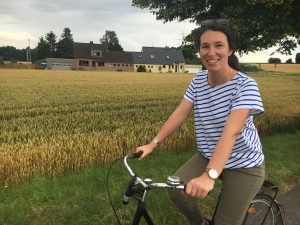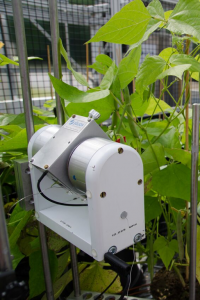- About
- Members
- Join
- Member log in
- Membership Renewal
- Member directory
- Life Members
- ASPS Life Member Professor Graham Farquhar
- ASPS Life Member Associate Professor Hendrik (Hank) Greenway
- ASPS Life Member Dr Marshall (Hal) D Hatch
- ASPS Life Member Dr Paul E Kriedmann
- ASPS Life Member Dr Mervyn Ludlow
- ASPS Life Member Emeritus Professor Rana Munns
- ASPS Life Member Conjoint Professor Christina E Offler
- ASPS Life Member Professor (Charles) Barry Osmond
- ASPS Life Member Emeritus Professor John W Patrick
- ASPS Life Member Dr Joe Wiskich
- Corresponding Members
- Elected Fellows
- Events
- Awards & Funding
- Employment
- Publications
- Research
- Teaching
- Menu
ASPS call for nominations
30 September 2016
Your membership is paid to [wpmlfield name=”paidtodate”] (year, month, day).
Dear ASPS members,
It seems that we have not received nominations for all the positions that fall vacant this year. In particular, we need to have nominations for Honorary Treasurer, Discipline rep for Plant Microbe Interactions and student representatives. You may recall we had the good fortune of needing to hold an election last year for one of the Discipline areas.
I would like to thank Brent Kaiser for his efforts as ASPS Honorary Treasurer and urge you to consider helping the society by nominating for this position which is generally held for a 3 year term. The nomination form is attached and it needs to reach the Secretary by October 3.
Thanks
John
Professor John R Evans FAA
Head, Division of Plant Sciences
Research School of Biology
The Australian National University
134 Linnaeus Way
Acton, ACT, 2601, Australia
T: 61 2 6125 4492
M: 0477 777132
W: http://biology.anu.edu.au/john_evans/
E: John.evans@anu.edu.au
President, Australian Society of Plant Scientists
ARC Centre of Excellence for Translational Photosynthesis
RN Robertson Travelling Fellowship – Report by Millicent Smith
27 September 2016
Using P. vulgaris (common bean) as a model system my PhD research has focused on the impact of abiotic stress, particularly drought and phosphorus deficiency, on photosynthetic capacity and the translation of resources into a developing seed.
Initial discussions with my PhD supervisor, Dr. Andrew Merchant, kept coming back to the same problem of our inability to fully understand source-sink dynamics if we couldn’t measure sink strength. This eventually led us to a portable NMR sensor, developed by Dr. Carel Windt and others at the Institute of Bio- and Geosciences (IBG-2) at Forschungszentrum Jülich (FZJ). FZJ is a large interdisciplinary science research centre set in a beautiful forest close to a town called Jülich, in the west of Germany.
The mobile nuclear magnetic resonance sensor (NMR) allows for the non-invasive, real-time measurement of water status and dry matter accumulation over seed development. Due to the portable and compact nature of the sensor it may be used to analyse components of a whole fixed plant, for instance a developing fruit (see Windt et al. 2011).
During the first year of my PhD, I worked closely with Dr. Carel Windt to assess the suitability and application of the NMR sensor in common bean. This initial visit to Jülich was the first time the NMR sensor was applied to a biological question. It was an important first step as we were able to complete a calibration and an experiment during this time.
I have learned a lot since that initial visit and thanks to the support from the Australian Society of Plant Scientists R.N Robertson Travelling Fellowship I was able to return to Jülich this year. Having previously visited for a short time in 2014 made it a little easier this time around. Not only did I have the knowhow for navigating the huge “SeeCasino” cafeteria, so lunchtime wasn’t as confusing, I also had a better understanding of the NMR methodology that we were able to apply to our experiments and answer some new questions.
We planned two separate experiments both aiming to manipulate source strength and observe whether we are able to detect a change in pod loading rates. One experiment was completed in a small climate chamber where we altered lengths of light-dark periods in an attempt to assess whether changes in starch cycling would impact on the developing grain, in particular the timing and magnitude of such an effect. The other experiment completed in the glasshouse using a multiplexed NMR system (6 NMR sensors all attached to the 1 spectrometer so we can measure lots of plants at once and keep measurements consistent) altered source strength of plants by pruning to investigate whether we could detect changes in loading rates within the sink tissue compared to plants that weren’t pruned.
While the glasshouse experiment didn’t go exactly as planned towards the end when a European “heat wave” stopped measurement time, what we found from both experiments was exciting and unexpected. Our results showed that under a range of conditions where source strength was manipulated, for instance a week in the dark and/or significant pruning (80% leaf area removed), loading of dry matter into the pod stayed the same as prior to the treatment or relative to the control. This result has sparked my interest and made me consider whether pods are more independent of leaves than we had previously thought.
Overall my time in Jülich was amazing. It was nice to have a taste of European life; I enjoyed riding my bicycle to the institute (on the days when it wasn’t raining) through the fields and forest, I loved trying different unpronounceable German bakery treats and sitting in the town square having a beer from the pub. It was great to be in Jülich for the biannual open day Tag der Neguier where I could join thousands of others when FZJ stopped their strict security checks for 1 day for citizens to come and discover the interesting research that they do and share in the excitement and passion that everyday Germans have for science.
I have come away from my visits to Jülich with lots of exciting data for my thesis (and some papers) but most of all I left knowing that I had made connections with leaders in my field, been exposed to interesting and novel ideas and technologies that I might have considered impossible before and confidence in my ability to collaborate, communicate and initiate my ideas.
I am incredibly grateful to the ASPS for awarding me an R.N Robertson Travelling Fellowship, to Carel Windt for inviting me to FZJ and the many others in the Emerging Technologies group for the lunchtime conversations and help, and finally to my supervisors Andrew Merchant and Tom Buckley who have encouraged me to collaborate and pursue interesting scientific questions.
Phytogen Blog: RN Robertson Travelling Fellowship – Report by Millicent Smith
27 September 2016
Phytogen Blog: RN Robertson Travelling Fellowship –
Report by Millicent Smith
Using P. vulgaris (common bean) as a model system my PhD research has focused on the impact of abiotic stress, particularly drought and phosphorus deficiency, on photosynthetic capacity and the translation of resources into a developing seed.
Initial discussions with my PhD supervisor, Dr. Andrew Merchant, kept coming back to the same problem of our inability to fully understand source-sink dynamics if we couldn’t measure sink strength. This eventually led us to a portable NMR sensor, developed by Dr. Carel Windt and others at the Institute of Bio- and Geosciences (IBG-2) at Forschungszentrum Jülich (FZJ). FZJ is a large interdisciplinary science research centre set in a beautiful forest close to a town called Jülich, in the west of Germany.
The mobile nuclear magnetic resonance sensor (NMR) allows for the non-invasive, real-time measurement of water status and dry matter accumulation over seed development. Due to the portable and compact nature of the sensor it may be used to analyse components of a whole fixed plant, for instance a developing fruit (see Windt et al. 2011).
During the first year of my PhD, I worked closely with Dr. Carel Windt to assess the suitability and application of the NMR sensor in common bean. This initial visit to Jülich was the first time the NMR sensor was applied to a biological question. It was an important first step as we were able to complete a calibration and an experiment during this time.
I have learned a lot since that initial visit and thanks to the support from the Australian Society of Plant Scientists R.N Robertson Travelling Fellowship I was able to return to Jülich this year. Having previously visited for a short time in 2014 made it a little easier this time around. Not only did I have the knowhow for navigating the huge “SeeCasino” cafeteria, so lunchtime wasn’t as confusing, I also had a better understanding of the NMR methodology that we were able to apply to our experiments and answer some new questions.
We planned two separate experiments both aiming to manipulate source strength and observe whether we are able to detect a change in pod loading rates. One experiment was completed in a small climate chamber where we altered lengths of light-dark periods in an attempt to assess whether changes in starch cycling would impact on the developing grain, in particular the timing and magnitude of such an effect. The other experiment completed in the glasshouse using a multiplexed NMR system (6 NMR sensors all attached to the 1 spectrometer so we can measure lots of plants at once and keep measurements consistent) altered source strength of plants by pruning to investigate whether we could detect changes in loading rates within the sink tissue compared to plants that weren’t pruned.
While the glasshouse experiment didn’t go exactly as planned towards the end when a European “heat wave” stopped measurement time, what we found from both experiments was exciting and unexpected. Our results showed that under a range of conditions where source strength was manipulated, for instance a week in the dark and/or significant pruning (80% leaf area removed), loading of dry matter into the pod stayed the same as prior to the treatment or relative to the control. This result has sparked my interest and made me consider whether pods are more independent of leaves than we had previously thought.
Overall my time in Jülich was amazing. It was nice to have a taste of European life; I enjoyed riding my bicycle to the institute (on the days when it wasn’t raining) through the fields and forest, I loved trying different unpronounceable German bakery treats and sitting in the town square having a beer from the pub. It was great to be in Jülich for the biannual open day Tag der Neguier where I could join thousands of others when FZJ stopped their strict security checks for 1 day for citizens to come and discover the interesting research that they do and share in the excitement and passion that everyday Germans have for science.
I have come away from my visits to Jülich with lots of exciting data for my thesis (and some papers) but most of all I left knowing that I had made connections with leaders in my field, been exposed to interesting and novel ideas and technologies that I might have considered impossible before and confidence in my ability to collaborate, communicate and initiate my ideas.
I am incredibly grateful to the ASPS for awarding me an R.N Robertson Travelling Fellowship, to Carel Windt for inviting me to FZJ and the many others in the Emerging Technologies group for the lunchtime conversations and help, and finally to my supervisors Andrew Merchant and Tom Buckley who have encouraged me to collaborate and pursue interesting scientific questions.
Women’s Leadership Development Scholarships
24 September 2016
Your membership is paid to[wpmlfield name=”paidtodate”] (year, month, day).
Dear ASPS member,
Women & Leadership Australia has just launched a third program in our portfolio of women’s leadership development programs.
With this third program we now have an unprecedented line up of leadership programs specifically designed for women:
· Advanced Leadership Program – Aimed at senior managers, directors and executive level women
· Executive Ready – Aimed at mid-level managers and leaders looking to take the next step into an executive role
· Accelerated Leadership Performance Program – Aimed at aspiring talent and women starting their journeys in managerial roles.
We have secured scholarship funding for the All Industry sector across all three programs. To ensure as many women in the All Industry sector are aware of this funding opportunity, we are inviting respected associations such as Australian Society of Plant Scientists to share this information with your members.
To assist you in disseminating the information to your members, I have attached a short message and a scholarship Expression of Interest form. If you need the message in a different format please let me know.
Association Partner Program
Further to our request that you kindly make your members aware of this opportunity, we are also introducing an Association Partner Program, meaning that your members would be exclusively eligible to apply for scholarship funding throughout the year, along with having your logo’s, web-links and information about how you are supporting the initiative (and gender equality in general) on the WLA website.
To help us track when information is distributed and to respond to enquiries promptly, it would be greatly appreciated if you could let me know if and when you are able to send out the information.
If you have any questions or would like to discuss this opportunity and or the partner program in more detail, I would be delighted to arrange a time to talk. Please feel free to contact me directly on (03) 9270 9016, or contact me via return email.
Many thanks and best regards
Ian Johnson
National Program Liaison Manager
Women and Leadership Australia
P 03 9270 9016
W www.wla.edu.au| E ijohnson@wla.edu.au
A Level 9, 607 Bourke Street, Melbourne VIC 3000
Women’s Leadership Development Scholarships
24 September 2016
Your membership is paid to[wpmlfield name=”paidtodate”] (year, month, day).
Dear ASPS member,
Women & Leadership Australia has just launched a third program in our portfolio of women’s leadership development programs.
With this third program we now have an unprecedented line up of leadership programs specifically designed for women:
· Advanced Leadership Program – Aimed at senior managers, directors and executive level women
· Executive Ready – Aimed at mid-level managers and leaders looking to take the next step into an executive role
· Accelerated Leadership Performance Program – Aimed at aspiring talent and women starting their journeys in managerial roles.
We have secured scholarship funding for the All Industry sector across all three programs. To ensure as many women in the All Industry sector are aware of this funding opportunity, we are inviting respected associations such as Australian Society of Plant Scientists to share this information with your members.
To assist you in disseminating the information to your members, I have attached a short message and a scholarship Expression of Interest form. If you need the message in a different format please let me know.
Association Partner Program
Further to our request that you kindly make your members aware of this opportunity, we are also introducing an Association Partner Program, meaning that your members would be exclusively eligible to apply for scholarship funding throughout the year, along with having your logo’s, web-links and information about how you are supporting the initiative (and gender equality in general) on the WLA website.
To help us track when information is distributed and to respond to enquiries promptly, it would be greatly appreciated if you could let me know if and when you are able to send out the information.
If you have any questions or would like to discuss this opportunity and or the partner program in more detail, I would be delighted to arrange a time to talk. Please feel free to contact me directly on (03) 9270 9016, or contact me via return email.
Many thanks and best regards
Ian Johnson
National Program Liaison Manager
Women and Leadership Australia
P 03 9270 9016
W www.wla.edu.au| E ijohnson@wla.edu.au
A Level 9, 607 Bourke Street, Melbourne VIC 3000
ASPS annual dinner
14 September 2016
Your membership is paid to [wpmlfield name=”paidtodate”] (year, month, day).
Hello ASPS members,
Our annual dinner is being held during ComBio in Brisbane on Wednesday October 5 at 7pm. I would like to encourage all our ASPS members attending ComBio to come along and for those of you near Brisbane that may not be attending ComBio, you are invited as well. My Linh Hoang has arranged this year’s event and it will be slightly different because it comes with sponsorship! The dinner will cost $50 for members and students will be subsidised, so the cost for them is just $20, but there is a catch – the venue has only enough space for 10 tables with 8 people at each so you need to let My Linh lt.hoang@qut.edu.au know if you are interested by 25 September. Payment and ticket issue will happen at the ComBio registration desk from Tuesday lunchtime onwards (4 Oct). The dinner will be two courses with wine/soft drink/tea/coffee and be held in the panoramic Gibson room on the 10th floor of QUT, just across the river from the convention centre. For those of you who have come in previous years, you will know that it is a great event that brings our society together and catch up or get to know new members. Normally it is organised by our student representatives, but the sponsorship offer from QUT-IFE https://www.qut.edu.au/institute-for-future-environments this year seemed a great opportunity.
I hope to see you there.
John
Professor John R Evans FAA President, Australian Society of Plant Scientists
E: john.evans@anu.edu.au
Science and Technology Australia-Aug newsletter, new Phytogen post and another employment opportunity
07 September 2016
Your membership is paid to [wpmlfield name=”paidtodate”] (Year, month, day)
Read the latest Phytogen blog : A moment of great bravery
View a new postdoctoral employment opportunity in plant physiology here.
|
ComBio 2106 program available, scholarship opportunity and GPC Aug e-bulletin
05 September 2016
Your membership is paid to [wpmlfield name=”paidtodate”] (Year, month, day).
New scholarship opportunity available here.
ComBio2016: 3 – 7 October 2016, Brisbane Convention & Exhibition Centre
ComBio2016 is a combined conference with the ASBMB, ASPS and ANZSCDB
We are pleased to advise that the final program is now available for perusal.
You can view the program at: http://www.asbmb.org.au/combio2016/program.html
There are four separate files which consist of:
The one page program timetable.
The full program timetable (9 pages).
The full program (including plenary, symposium and colloquium presentations).
The poster program.
All abstracts can also now be viewed at: http://www.asbmb.org.au/combio2016/abstracts.html
There are five separate files which consist of:
Plenary Abstracts
Symposium Abstracts
Colloquium Abstracts
Poster Abstracts
Author Index
The conference app will be available a few days prior to the conference. The app will include the full program including posters, all abstracts, all companies exhibiting and a list of registrants (less those that have requested privacy). We will send you a further email when the app is accessible.
Please note that registrations are still welcome and also “on site” poster abstract submissions are still welcome up until, and including, Monday 26 September. On site presentations will not be included in the hard copy of the program, on the website or on the conference app, but will be included on the conference program revisions board. On site poster abstracts can be submitted at: https://www.asbmb.org.au/Register/combio2016-abstract-form.cgi
and registrations can be made at: https://www.asbmb.org.au/Register/combio2016-registration-form.cgi
If you have difficulty accessing these pages, you should refresh your browser.
Kind regards
Sally
Sally Jay
ComBio2016 Secretariat
Email: combio@asbmb.org.au
|
A moment of great bravery
05 September 2016
by
Joanne Ernest
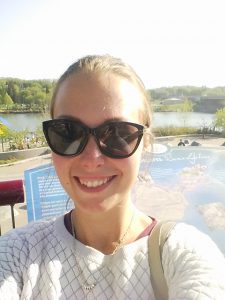 I began my PhD in 2010 with Dr Tony Gendall at La Trobe University, Melbourne. Tony’s group is using reverse genetics to investigate the physiological and cellular roles of two sodium/proton antiporters. These proteins affect cell differentiation and expansion, ro
I began my PhD in 2010 with Dr Tony Gendall at La Trobe University, Melbourne. Tony’s group is using reverse genetics to investigate the physiological and cellular roles of two sodium/proton antiporters. These proteins affect cell differentiation and expansion, ro
ot length and lateral root development as well as subcellular trafficking. In my thesis I described the expression patterns of these antiporters in Arabidopsis, and described their role in trafficking seed proteins to a specialised storage vacuole in developing embryos. I presented some this work at two ComBio meetings (2012 and 2014), as well as the International Conference for Arabidopsis Research (ICAR) in 2013, the Australian Research Assembly on Brassicas (ARAB) in 2014, and the Agriculture Bioscience International Conference in 2015. A chapter of my thesis was published in 2015 in the journal of Plant and Cell Physiology (Ashnest et al. 2015).
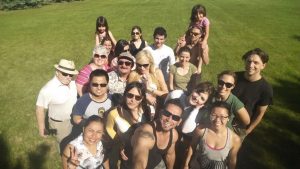 Like many other PhD candidates, I began looking for a post doc fellowship about 6 months before submitting my thesis. I had applied for several advertised positions, but hadn’t been granted even an interview. Then in May of 2015, I met Dr Tim Sharbel at a free seminar at the AgriBio Systems Biology conference. Tim was in the process of moving his entire lab from Germany to Canada, and was recruiting post docs. Tim’s content and manner really impressed me, and when he mentioned that he was hiring, I decided on the spur of the moment that I would approach him about a job. I went to the ladies’ room and did the “power pose” for 2 minutes, then bravely walked up to Tim and introduced myself (he’s since told me that he had no idea how nervous I was…). We had a brief chat, and arranged to meet more comprehensively the next day. I remember going home and asking my husband, “how do you feel about Canada? Because I met this guy today…”
Like many other PhD candidates, I began looking for a post doc fellowship about 6 months before submitting my thesis. I had applied for several advertised positions, but hadn’t been granted even an interview. Then in May of 2015, I met Dr Tim Sharbel at a free seminar at the AgriBio Systems Biology conference. Tim was in the process of moving his entire lab from Germany to Canada, and was recruiting post docs. Tim’s content and manner really impressed me, and when he mentioned that he was hiring, I decided on the spur of the moment that I would approach him about a job. I went to the ladies’ room and did the “power pose” for 2 minutes, then bravely walked up to Tim and introduced myself (he’s since told me that he had no idea how nervous I was…). We had a brief chat, and arranged to meet more comprehensively the next day. I remember going home and asking my husband, “how do you feel about Canada? Because I met this guy today…”
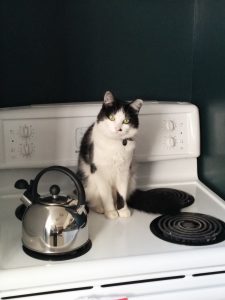 Tim and I chatted for about an hour the following morning. No pressure, I thought, but this is an interview! In the end it went really well; I had the skill set that Tim was looking for and we got along great. About a fortnight later, after Tim had read my CV and some positive emails from my referees, he offered me a job! There was a little more back and forth over contracts, and it took some time for us to arrange permits to work and live in Canada, and to pack up our home and all our things, but about 6 months later my husband, my cat and I were boarding a plane to Saskatoon. Now I’m living on the other side of the world, working with a wonderful team of people, and doing some really exciting science. I owe it all to the power pose and a moment of great bravery!
Tim and I chatted for about an hour the following morning. No pressure, I thought, but this is an interview! In the end it went really well; I had the skill set that Tim was looking for and we got along great. About a fortnight later, after Tim had read my CV and some positive emails from my referees, he offered me a job! There was a little more back and forth over contracts, and it took some time for us to arrange permits to work and live in Canada, and to pack up our home and all our things, but about 6 months later my husband, my cat and I were boarding a plane to Saskatoon. Now I’m living on the other side of the world, working with a wonderful team of people, and doing some really exciting science. I owe it all to the power pose and a moment of great bravery!
Author email: Dr Joanne Ernest < joanne.ernest@gifs.ca>
Recent Posts
Tags
Archives
- June 2025
- May 2025
- April 2025
- March 2025
- February 2025
- January 2025
- December 2024
- November 2024
- October 2024
- September 2024
- August 2024
- July 2024
- June 2024
- May 2024
- April 2024
- February 2024
- January 2024
- November 2023
- October 2023
- September 2023
- August 2023
- July 2023
- June 2023
- May 2023
- April 2023
- March 2023
- February 2023
- December 2022
- November 2022
- October 2022
- September 2022
- August 2022
- July 2022
- June 2022
- May 2022
- April 2022
- March 2022
- February 2022
- January 2022
- December 2021
- November 2021
- October 2021
- September 2021
- August 2021
- July 2021
- June 2021
- April 2021
- March 2021
- February 2021
- January 2021
- December 2020
- November 2020
- October 2020
- September 2020
- August 2020
- July 2020
- June 2020
- May 2020
- April 2020
- March 2020
- February 2020
- January 2020
- December 2019
- November 2019
- October 2019
- September 2019
- August 2019
- July 2019
- June 2019
- May 2019
- April 2019
- March 2019
- February 2019
- January 2019
- December 2018
- November 2018
- October 2018
- September 2018
- August 2018
- July 2018
- June 2018
- May 2018
- April 2018
- March 2018
- February 2018
- January 2018
- December 2017
- November 2017
- October 2017
- September 2017
- August 2017
- July 2017
- June 2017
- May 2017
- April 2017
- March 2017
- February 2017
- January 2017
- December 2016
- November 2016
- October 2016
- September 2016
- August 2016
- July 2016
- June 2016
- May 2016
- April 2016
- March 2016
- February 2016
- January 2016
- December 2015
- November 2015
- October 2015
- September 2015
- August 2015
- July 2015
- June 2015
- May 2015
- April 2015
- March 2015
- February 2015
- January 2015
- December 2014
- November 2014
- October 2014
- September 2014
- August 2014
- July 2014
- June 2014
Copyright 2017 Australian Society of Plant Scientists Disclaimer & Privacy
Website by Michael Major Media

